与身体部位相互的英语习语
- 格式:doc
- 大小:23.63 KB
- 文档页数:13
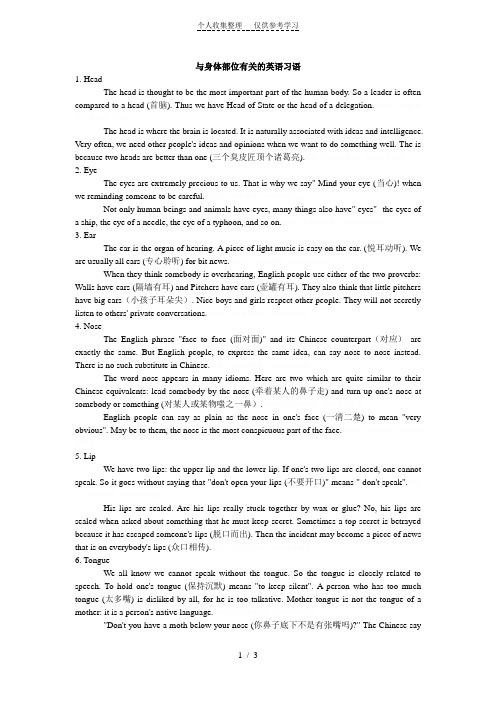
与身体部位有关的英语习语1. HeadThe head is thought to be the most important part of the human body. So a leader is often compared to a head (首脑). Thus we have Head of State or the head of a delegation.The head is where the brain is located. It is naturally associated with ideas and intelligence. Very often, we need other people's ideas and opinions when we want to do something well. The is because two heads are better than one (三个臭皮匠顶个诸葛亮).2. EyeThe eyes are extremely precious to us. That is why we say" Mind your eye (当心)! when we reminding someone to be careful.Not only human beings and animals have eyes, many things also have" eyes"- the eyes ofa ship, the eye of a needle, the eye of a typhoon, and so on.3. EarThe ear is the organ of hearing. A piece of light music is easy on the ear. (悦耳动听). We are usually all ears (专心聆听) for bit news.When they think somebody is overhearing, English people use either of the two proverbs: Walls have ears (隔墙有耳) and Pitchers have ears (壶罐有耳). They also think that little pitchers have big ears(小孩子耳朵尖). Nice boys and girls respect other people. They will not secretly listen to others' private conversations.4. NoseThe English phrase "face to face (面对面)" and its Chinese counterpart(对应)are exactly the same. But English people, to express the same idea, can say nose to nose instead. There is no such substitute in Chinese.The word nose appears in many idioms. Here are two which are quite similar to their Chinese equivalents: lead somebody by the nose (牵着某人的鼻子走) and turn up one's nose at somebody or something (对某人或某物嗤之一鼻).English people can say as plain as the nose in one's face (一清二楚) to mean "very obvious". May be to them, the nose is the most conspicuous part of the face.5. LipWe have two lips: the upper lip and the lower lip. If one's two lips are closed, one cannot speak. So it goes without saying that "don't open your lips (不要开口)" means " don't speak".His lips are sealed. Are his lips really stuck together by wax or glue? No, his lips are sealed when asked about something that he must keep secret. Sometimes a top secret is betrayed because it has escaped someone's lips (脱口而出). Then the incident may become a piece of news that is on everybody's lips (众口相传).6. TongueWe all know we cannot speak without the tongue. So the tongue is closely related to speech. To hold one's tongue (保持沉默) means "to keep silent". A person who has too much tongue (太多嘴) is disliked by all, for he is too talkative. Mother tongue is not the tongue of a mother: it is a person's native language."Don't you have a moth below your nose (你鼻子底下不是有张嘴吗)?" The Chinese sayso to blame a person who did not say what he should have said. But this not the right way to express the idea in English. English people would say, "You have a tongue in your head, haven't you?"7. FaceFace has to do with the idea of respect and dignity both in Chinese and English. You lose your face (丢面子) if you fail again and again, but a decisive victory will save your face (挽回面子) after all your failures.When you feel unhappy, you pull a long face (拉长脸). The idea is conveyed in Chinese in the same way. But "about face (向后转)" does not refer to the face. It is a military order to turn round and face in the opposite direction. It is the exact equivalent of " about turn".8. ShoulderThe shoulders can bear heavy things. Your father has a great responsibility for the family on his shoulder. When faced with difficulty, the family should stand shoulder to shoulder (肩并肩) to overcome it. You should not turn a cold shoulder (不理睬) to your family members. Nor should you give your friends the cold shoulder (冷落朋友). Both expressions mean treating others coldly.9. BackA good host is hospitable to his guests. But, if guest is tiresome, the host is glad to see his back (他离开).If your friend has done something really well, you may give him a pat on the back (轻轻拍背部) to show your appreciation.If you turn your back on somebody (不理睬他人), you mean you do not like making friends with that person.10. HeartThe heart is an extremely important organ inside the chest. It usually stands for something important or the centre of something, for example, the heart of the matter (问题的核心) or the heart of mystery.Many other expressions make use of the word heart. A lover can be called a sweet heart (情人). The Purple Heart (紫心徽章) is a medal given as an honor to American soldiers wounded in battle.If your friend is in trouble, you may encourage him by saying "Don't lose heart (不要灰心)."11. StomachThe stomach is naturally related to one's appetite. If you dislike heavy food, you have no stomach for it (反胃). The word is also related to one's interests or likings. If you find something boring or vulgar, you have no stomach for it, either. Bad food turns your stomach. Similarly, your stomach turns at a bad joke.Stomach can also be a verb. Look at this example: "How could you stomach (忍受) such rude words?" Apparently, stomach here can be replaced by "tolerate".12. ArmEvery person has two arms: the right arm and the left arm. The right arm is usually stronger, so we call a good helper the right arm (得力助手).We all know an arm is not very long. But when you keep someone at arm's length (保持距离), the distance is long enough. For that means you don not like that person and you try your best to avoid him or her. We should indeed keep the bad friends at arm's length.13. HandQuite a number of phrases formed form the word hand are very similar to their Chinese counterparts. Here are some obvious examples: a fresh hand (新手), short of hands (人手短缺), hand in hand (手拉手) and wash one's hands of something (洗手不干了). But do not always take this for granted. Study these examples and you will understand.He lives from hand to mouth (He has just enough money to live on). We gave them a big hand (We gave them lots of applause).14. FingerHow many fingers does each of your hands have? Now let's name them in English from the smallest: the little finger, the ring finger, the middle finger, the index finger and thumb.Each finger has its own part to play. If your fingers are all thumbs (笨拙), that is too bad. That means you are very clumsy.15. ThumbChinese people turn up their thumbs to express appreciation. English people do so to express not only appreciation but also approval. Chinese people never turn their thumbs down to mean anything. But English people do. They do so to show depreciation disapproval. Thus in English you can say, "We turn thumbs up (赞成) to Jack's suggestion but they turn thumbs down (不赞成) to it."Similarly, you can warmly praise someone by saying "Thumbs up (真棒)!" and show your dissatisfaction by saying "Thumbs down (差劲)!"16. SkinMost people will only think of the hair on our head when the word hair is mentioned. In fact, some animals and plants also have hair.A horrible scene may make a person's hair stand on end (毛骨悚然). But a courageous person will not turn a hair (不畏惧) even though he is in face of danger.Sometimes, a friend of yours may be so angry that he may act foolishly. Then you had better give him this advice: "Keep your hair on (别发脾气)".Selected from the book The Human Body by Huang Juanhua。
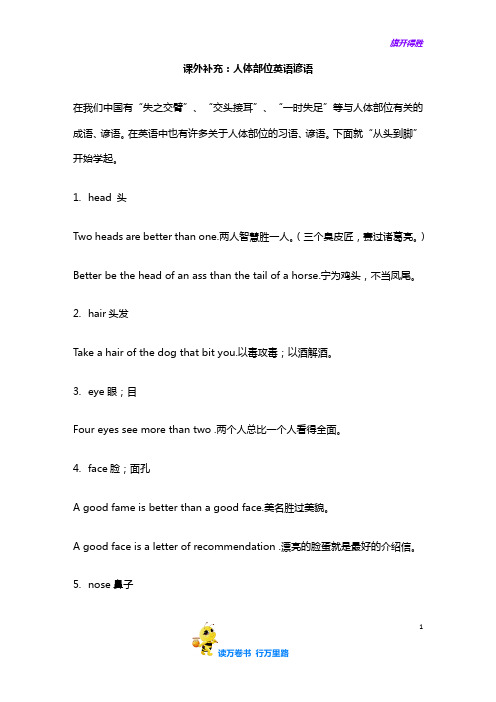
课外补充:人体部位英语谚语在我们中国有“失之交臂”、“交头接耳”、“一时失足”等与人体部位有关的成语、谚语。
在英语中也有许多关于人体部位的习语、谚语。
下面就“从头到脚”开始学起。
1.head 头Two heads are better than one.两人智慧胜一人。
(三个臭皮匠,赛过诸葛亮。
)Better be the head of an ass than the tail of a horse.宁为鸡头,不当凤尾。
2.hair头发Take a hair of the dog that bit you.以毒攻毒;以酒解酒。
3.eye眼;目Four eyes see more than two .两个人总比一个人看得全面。
4.face脸;面孔A good fame is better than a good face.美名胜过美貌。
A good face is a letter of recommendation .漂亮的脸蛋就是最好的介绍信。
5.nose鼻子1See no further than one’s nose.鼠目寸光。
6.mouth 嘴;口Keep your mouth shut and your eyes open.多看少说。
7.tooth 牙齿Be dressed to the teeth.浓妆艳抹。
8.heart心;心脏Nothing is too difficult if you put your heart into it.世上无难事,只怕有心人。
9.arm臂,胳膊Justice has long arms.天网恢恢,疏而不漏。
10.h and 手One hand washes another.有来有往,互相利用。
11.l eg腿;腿部Fall on your leg.逢凶化吉。
12.f oot 脚,足Have a foot in both camps.脚踏两只船。
2旗开得胜Better the foot slip than the tongue.宁可失足,不可失言。
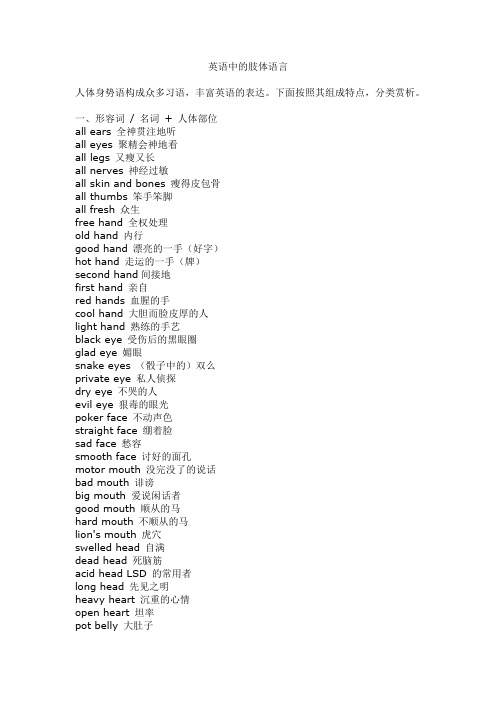
英语中的肢体语言人体身势语构成众多习语,丰富英语的表达。
下面按照其组成特点,分类赏析。
一、形容词/ 名词+ 人体部位all ears 全神贯注地听all eyes 聚精会神地看all legs 又瘦又长all nerves 神经过敏all skin and bones 瘦得皮包骨all thumbs 笨手笨脚all fresh 众生free hand 全权处理old hand 内行good hand 漂亮的一手(好字)hot hand 走运的一手(牌)second hand间接地first hand 亲自red hands 血腥的手cool hand 大胆而脸皮厚的人light hand 熟练的手艺black eye 受伤后的黑眼圈glad eye 媚眼snake eyes (骰子中的)双么private eye 私人侦探dry eye 不哭的人evil eye 狠毒的眼光poker face 不动声色straight face 绷着脸sad face 愁容smooth face 讨好的面孔motor mouth 没完没了的说话bad mouth 诽谤big mouth 爱说闲话者good mouth 顺从的马hard mouth 不顺从的马lion's mouth 虎穴swelled head 自满dead head 死脑筋acid head LSD 的常用者long head 先见之明heavy heart 沉重的心情open heart 坦率pot belly 大肚子stiff neck 顽固之人silver tongue 流利的口才mailed fist 暴力devil's bones 骰子loose lips 说话很随便cold shoulder 冷漠cold feet 胆怯green thumb 在园艺方面有才能的人Achilles heel 弱点busy body 管闲事者sweet tooth 爱吃甜食之人family skeleton 家丑二、人体部位+ 名词brain drain 人才外流brain trust 智囊团brain storm 突有灵感brain child 头脑的产物brain wave 计上心头tongue twister 绕口令face card 带人像的扑克牌face value 票面价值knee slipper 使人笑得拍大腿的笑话eye shot 视野bone shaker 老爷车skin dive 只戴眼罩的潜水skin game 赌博骗钱skull session 坐在一起动脑筋nose dive 一落千丈elbow grease 可施展之地chin music 聊天leg work 跑腿lip praise 表面的称赞lip service 空口的应酬话blood debt 血债belly laugh 捧腹大笑skin flick 色情电影三、动词+ 人体部位keep / save face 保全面子preserve face 保持面子maintain face 维护面子lose face 失去面子make faces 做鬼脸make mouths 对人做嘴脸make eyes 漫送秋波make head 前进count heads 点名knock head 叩头gather head 时机成熟change hands 易手join hands 携手联合kiss hands 吻君王之手hold hands 手搀手change foot 换步set foot 行走play footsie 情侣在桌底下碰脚rub elbow / shoulders 与人交往lose heart 沮丧take heart 鼓起勇气gain flesh 长肉lose flesh 消瘦tell noses 清点人数split hairs 作琐细的分析cut teeth 长牙give lip 讲硬话show leg 逃跑give / throw tongue 猫/狗狂吠shake hands 握手四、人体部位对称或并列face to face 面对面from ear to ear 开心limb to limb 肢解mouth to mouth 嘴对嘴heart to heart 交心shoulder to shoulder 齐头并进eye to eye 赞同eyeball to eyeball 面对面hand to hand 逼近head to head 交头接耳nose to nose 面对面back to back 背靠背hand in hand 手拉手arm in arm 挽臂neck and neck 并驾齐驱leg and leg 平分秋色side by side 肩并肩hand over hand 两手交叉使用from hand to hand 用手传递from mouth to mouth 口口相传from hand to mouth 勉强糊口from head to foot 全身from top to toe 从头到脚hand and foot 手脚一起;尽力heart and soul 全心全意tooth and nail 竭尽全力toe and heel 跳舞flesh and blood 人类head and ears 全身hand to fish 齐心协力hand over fist 多而快地赚钱hand over heels 倒栽葱tooth for tooth 以牙还牙eye for eye 以眼还眼五、人体部位在谚语的运用Two heads are better than one . 三个臭皮匠,胜似一个诸葛亮。
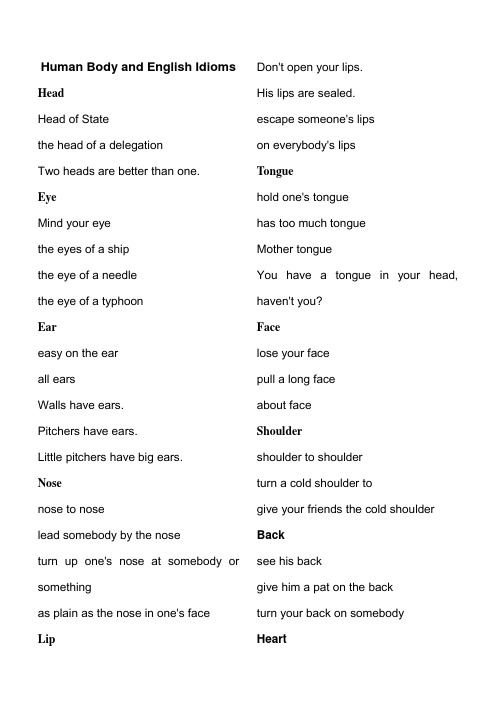
Human Body and English Idioms HeadHead of Statethe head of a delegationTwo heads are better than one.EyeMind your eyethe eyes of a shipthe eye of a needlethe eye of a typhoonEareasy on the earall earsWalls have ears.Pitchers have ears.Little pitchers have big ears.Nosenose to noselead somebody by the noseturn up one's nose at somebody or somethingas plain as the nose in one's faceLip Don't open your lips.His lips are sealed.escape someone's lipson everybody's lipsTonguehold one's tonguehas too much tongueMother tongueYou have a tongue in your head, haven't you?Facelose your facepull a long faceabout faceShouldershoulder to shoulderturn a cold shoulder togive your friends the cold shoulder Backsee his backgive him a pat on the backturn your back on somebodyHeartthe heart of the mattera sweet heartDon't lose heart.Stomachhave no stomach forturns your stomachyour stomach turns atHow could you stomach such rude words?Armthe right armkeep someone at arm's lengthHanda fresh hand short of hands hand in handwash one's hands of somethingHe lives from hand to mouth.We gave them a big hand.FingerIf your fingers are all thumbs, that means you are very clumsy.ThumbWe turn thumbs up to Jack's suggestion but they turn thumbs down to it.Thumbs up! Thumbs down! Nailfighting tooth and nailPeter is as hard as nails.hit the nail on the headLegLet's shake a leg.shake a legIt costs an arm and a leg.pull one's legToefrom top to toeSome people turn their toes out when they walk. Some turn their toes in.we must be on our toes.Skinhas a thin skin has a thick skin Hairmake a person's hair stand on endnot turn a hairKeep your hair on.。
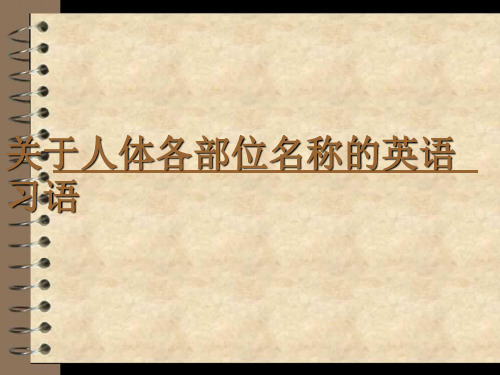
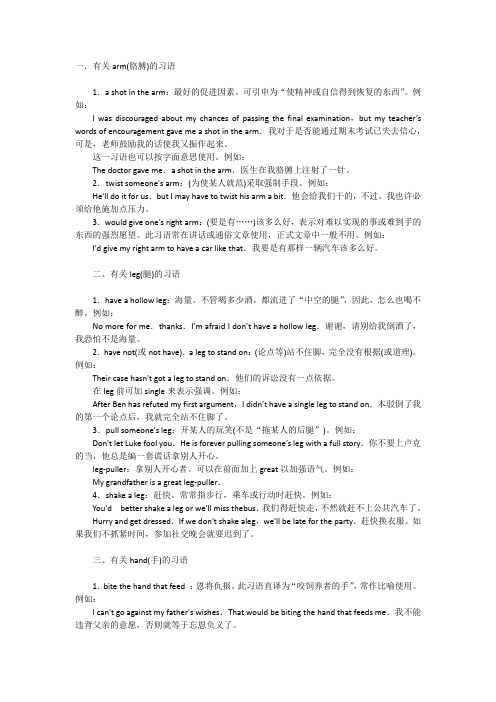
一.有关arm(胳膊)的习语1.a shot in the arm:最好的促进因素。
可引申为“使精神或自信得到恢复的东西”。
例如:I was discouraged about my chances of passing the final examination,but my teacher’s words of encouragement gave me a shot in the arm.我对于是否能通过期末考试已失去信心,可是,老师鼓励我的话使我又振作起来。
这一习语也可以按字面意思使用。
例如:The doctor gave me.a shot in the arm.医生在我胳膊上注射了一针。
2.twist someone's arm:(为使某人就范)采取强制手段。
例如:He'll do it for us.but I may have to twist his arm a bit.他会给我们干的,不过,我也许必须给他施加点压力。
3.would give one's right arm:(要是有……)该多么好,表示对难以实现的事或难到手的东西的强烈愿望。
此习语常在讲话或通俗文章使用,正式文章中一般不用。
例如:I'd give my right arm to have a car like that.我要是有那样一辆汽车该多么好。
二、有关leg(腿)的习语1.have a hollow leg:海量。
不管喝多少酒,都流进了“中空的腿”,因此,怎么也喝不醉。
例如:No more for me.thanks.I'm afraid I don’t have a hollow leg.谢谢,请别给我倒酒了,我恐怕不是海量。
2.have not(或not have).a leg to stand on:(论点等)站不住脚,完全没有根据(或道理)。
例如:Their case hasn't got a leg to stand on.他们的诉讼没有一点依据。
人体部位和英语习语(二)1. StomachThe stomach is naturally related to one's appetite. If you dislike heavy food, you have no stomach for it (反胃). The word is also related to one's interests or likings. If you find something boring or vulgar, you have no stomach for it, either. Bad food turns your stomach. Similarly, your stomach turns at a bad joke.Stomach can also be a verb. Look at this example: "How could you stomach (忍受) such rude words?"Apparently, stomach here can be replaced by "tolerate".2. ArmEvery person has two arms: the right arm and the left arm. The right arm is usually stronger, so we call a good helper the right arm (得力助手).We all know an arm is not very long. But when you keep someone at arm's length (保持距离), the distance is long enough. For that means you do not like that person and you try your best to avoid him or her. We should indeed keep the bad friends at arm's length.3. HandQuite a number of phrases formed form the word hand are very similar to their Chinese counterparts. Here are some obvious examples: a fresh hand (新手), short of hands (人手短缺), hand in hand (手拉手) and wash one's hands of something (洗手不干了). But do not always take this for granted. Study these examples and you will understand.He lives from hand to mouth (He has just enough money to live on). We gave them a big hand (We gave them lots of applause.).4. FingerHow many fingers does each of your hands have? Now let's name them in English from the smallest: the little finger, the ring finger, the middle finger, the index finger and thumb.Each finger has its own part to play. If your fingers are all thumbs (笨拙), that is too bad. That means you are very clumsy.5. ThumbChinese people turn up their thumbs to express appreciation. English peopled so to express not only appreciation but also approval. Chinese people never turn their thumbs down to mean anything. But English people do.They do so to show depreciation or disapproval. Thus in English you can say, "We turn thumbs up (赞成) to Jack's suggestion but they turn thumbs down (不赞成) to it." Similarly, you can warmly praise someone by saying "Thumbs up (真棒)!" and show your dissatisfaction by saying "Thumbs down (差劲)!"6. NailIf you see two of your classmates fighting tooth and nail (又抓又咬), you must stop them at once. Otherwise, at least one of them would be hurt.Nail also means a thin pointed piece of metal for hammering into something.But it is related to the body in this sentence: "Peter is as hard as nails (结实的像铁打的)."We all hope that we are as strong and healthy as he is.Then if I say you have hit the nail on the head (中肯,一针见血), I do not mean that you have done something cruel.I mean that you have said exactly the right thing.7. LegThe word leg appears in many colloquial expressions. At a party, when you feel like dancing, you can say to a good friend of yours, "Let's shake a leg." Obviously, it means"Let's dance." When you want your fiend to hurry, you can also "shake a leg". In American English it means "hurry".The arms and legs are very important to us. Therefore when asked why you are not going to buy something expensive, you may answer, "It costs an arm and a leg!" You mean that it is really expensive. If you pull one's leg, it means you make fun of someone.8. ToeTo convey the idea "from head to foot", English people can say from top to toe. But Chinese people don't.Some people turn their toes out (八字脚) when they walk. Some turn their toes in.When faced with danger, we must be alert and ready for action, that is to say, we must be on our toes (保持警惕).9. SkinHuman beings have skin. So have animals and plants. The skin can be thick or thin. A think-skinned person, or a person who has a thin skin, is easily upset or offended while a thick-skinned person, or a person who has a thick skin, is quite the contrary. Both expressions are sometimes derogatory (贬义).That is to say, sometimes the former refers to a personwho is too sensitive; the latter a person who has little sense of shame.10. HairMost people will only think of the hair on our head when the word hair is mentioned. In fact, some animals and plants also have hair.A horrible scene may make a person's hair stand on end (毛骨悚然). But a courageous person will not turn a hair (不畏惧) even though he is in face of danger.Sometimes, a friend of yours may be so angry that he may act foolishly. Then you had better give him this advice: "Keep your hair on (别发脾气)".。
与身体部位有关的英语俚语英语当中有很多俚语是跟人的身体部位有关的,有些意思很直白,有些需要你仔细揣摩一番,还有些就比较难懂了。
下面就跟着小编去看看吧。
眼睛an eye for eye 以牙还牙have bedroom eye有一双性感的眼睛an eye for something对某物有鉴赏力eye someone细看某人,打量某人have eyes bigger than one’s stomach眼馋肚饱four-eyes四眼(对戴眼镜者的贬称)give someone a black eye 把某人打鼻青眼肿make goo-goo eyes at someone对人抛媚眼green-eyed monster嫉妒心in a pig’s eye胡说,废话keep one’s eyes peeled 留心,警惕see eye-to-eye 看法一致耳朵be all ears 聚精会神地听,洗耳恭听bend someone ear与某人喋喋不休blow it out one’s ear胡说八道chew someone’s ear off对某人喋喋不休have an ear for music有音乐方面的天赋fall on deaf ears和没有心思的人说话;没被理睬good ear 辨别声音keep one’s ear to the ground注意听perk up one’s ear引起注意,坚起耳朵play by ear 听过歌曲后,不看乐谱而凭记忆演奏put a bug in someone’s ear事先给某人暗示;警告某人talk someone’s ear off因喋喋不休而惹怒某人鼻子as plain as the nose on one’s face一目了然,显而易见keep one’s nose to the grindstone埋头苦干,勤奋工作“It’s on skin off my onse”与我毫无关系take a nose dive突然衰弱,突然变弱have a nose for finding something善于发现某事物nose out 以微弱的优势打败对手,险胜get one’s nose in the air媚上傲下的,自负的pay though the nose to花很多钱poke one’s nose in someone’s business干预某人的事物,管闲事right under one’s nose显而易见的,一目了然turn one’s nose up at someone or something拒绝某人或某事嘴巴bad-mouth someone说某人坏说,撒布流言蜚语big-mouth 多嘴的人,喋喋不休的down in the mouth神情沮丧的,垂头丧气live hand –to-mouth勉强糊口,勉强维持生活mouth off傲慢无礼,顶嘴run off at the mouth滔滔不绝地淡论,没完没了shoot off one’s mouth随便乱说,信口开河手at hand紧迫的,重要的give someone a hand 帮助某人hand it to someone佩服某人hands down无疑,当然know something like the back of one’s对某事物了如指掌live hand-to-mouth毫无积蓄,勉强糊口an old hand at something做某事的老手,熟手on hand在手头,现有out of hand失去控制,无法控制the right hand doesn’t know what the left handis doing互不通气try one’s hand at something试试身手脚get back on one’s feet 从失败中重新站起来get cold feet在最后时刻失去勇气,临阵畏缩foot the bill付账,买单get a foot in the door迈向目标的第一步get one’s feet wet逐渐熟悉情况hotfoot it急匆匆one foot in the grave一只脚已经踏入坟墓,行将就木put one’s foot down禁止,阻止pussy-foot around谨言慎行,拐弯抹角quick on one’s own two feet很快想出办法be swept off one’s feet被诱惑,被迷住stand on one’s own two feet独立自主,自主throw oneself at someone’s完全屈服于某人,完全拜倒在某人脚下get under one’s feet阻碍某人,妨碍某人get off on the wrong foot (朋友之间)刚开始时关系不好。
身体部位的英语谚语be dressed to the teeth 浓妆艳抹armed to the teeth 武装到牙齿If you can't bite ,never show your teeth .不能咬人就别龇牙。
A still tongue makes a wise head .智者寡言The tongue isn't steel ,yet it cuts .舌非刀剑,但能伤人。
Nothing is too difficult if you put your heart intoit .(Nothing is impossible to a willing heart .)世上无难事,只怕有心人。
What the heart thinks the tongue speaks .言为心声speak though one's neck 吹牛bend one's neck 俯首听命be up one's shoulders 工作忙得不可开交cold shoulders 冷遇,白眼Justice has long arm.天网恢恢,疏而不漏Stretch your arm no further than your sleeve will reach .量入为出be all thumb笨手笨脚count one'd thumbs消磨时间A cold hand and a warm heart .手冷心肠热One hand washes another .有来有往;互相利用fall on one's leg逢凶化吉as fast as one'd legs can carry one 开足马力,拼命跑across one's knee(把小孩)脸朝下放在膝盖上打屁股beat sb to his knees打败某人have a foot in both camps脚踏两只船Better the foot slip than the tongue (Better to slipwith the tongue )宁可失足,不可失言。
有关人体身体部位的英文谚语习语身体部位的英语谚语be dressed to the teeth 浓妆艳抹armed to the teeth 武装到牙齿If you can't bite ,never show your teeth .不能咬人就别龇牙。
A still tongue makes a wise head .智者寡言The tongue isn't steel ,yet it cuts .舌非刀剑,但能伤人。
Nothing is too difficult if you put your heart intoit .(Nothing is impossible to a willing heart .)世上无难事,只怕有心人。
What the heart thinks the tongue speaks .言为心声speak though one's neck 吹牛bend one's neck 俯首听命be up one's shoulders 工作忙得不可开交cold shoulders 冷遇,白眼Justice has long arm.天网恢恢,疏而不漏Stretch your arm no further than your sleeve will reach .量入为出be all thumb笨手笨脚count one'd thumbs消磨时间A cold hand and a warm heart .手冷心肠热One hand washes another .有来有往;互相利用fall on one's leg逢凶化吉as fast as one'd legs can carry one 开足马力,拼命跑across one's knee(把小孩)脸朝下放在膝盖上打屁股beat sb to his knees 打败某人have a foot in both camps脚踏两只船Better the foot slip than the tongue (Better to slipwith the tongue )宁可失足,不可失言。
与身体部位相关的英语习语1. HeadThe head is thought to be the most important part of the human body. So a leader is often compared to a head (首脑). Thus we have Head of State or the head of a delegation.The head is where the brain is located. It is naturally associated with ideas and intelligence. Very often, we need other people's ideas and opinions when we want to do something well. The is because two heads are better than one (三个臭皮匠顶个诸葛亮).2. EyeThe eyes are extremely precious to us. That is why we say" Mind your eye (当心)! when we reminding someone to be careful.Not only human beings and animals have eyes, many things also have" eyes" the eyes of a ship, the eye of a needle, the eye of a typhoon, and so on.3. EarThe ear is the organ of hearing. A piece of light music is easy on the ear. (悦耳动听). We are usually all ears (专心聆听) for bit news.When they think somebody is overhearing, English people use either of the two proverbs: Walls have ears (隔墙有耳) and Pitchers have ears (壶罐有耳). They also think that little pitchers have big ears(小孩子耳朵尖). Nice boys and girls respect other people. They will not secretly listen to others' private conversations.4. NoseThe English phrase "face to face (面对面)" and its Chinese counterpart(对应) are exactly the same. But English people, to express the same idea, can say nose to nose instead. There isno such substitute in Chinese.The word nose appears in many idioms. Here are two which are quite similar to their Chinese equivalents: lead somebody by the nose (牵着某人的鼻子走) and turn up one's nose at somebody or something (对某人或某物嗤之一鼻).English people can say as plain as the nose in one's face (一清二楚) to mean "very obvious". May be to them, the nose is the most conspicuous part of the face.5. LipWe have two lips: the upper lip and the lower lip. If one's two lips are closed, one cannot speak. So it goes without saying that "don't open your lips (不要开口)" means "don't speak". His lips are sealed. Are his lips really stuck together by wax or glue? No, his lips are sealed when asked about something that he must keep secret. Sometimes a top secret is betrayed because it has escaped someone's lips (脱口而出). Then the incident may become a piece of news that is on everybody's lips (众口相传).6. TongueWe all know we cannot speak without the tongue. So the tongue is closely related to speech. To hold one's tongue (保持沉默) means "to keep silent". A person who has too much tongue (太多嘴) is disliked by all, for he is too talkative. Mother tongue is not the tongue of a mother: it is a person's native language."Don't you have a moth below your nose (你鼻子底下不是有张嘴吗)?" The Chinese say so to blame a person who did not say what he should have said. But this not the right way to express the idea in English. English people would say, "You have a tongue in your head, haven't you?"7. FaceFace has to do with the idea of respect and dignity both in Chinese and English. You lose your face (丢面子) if you fail again and again, but a decisive victory will save your face (挽回面子) after all your failures.When you feel unhappy, you pull a long face (拉长脸). The idea is conveyed in Chinese in the same way. But "about face (向后转)" does not refer to the face. It is a military order to turn round and face in the opposite direction. It is the exact equivalent of " about turn".8. ShoulderThe shoulders can bear heavy things. Your father has a great responsibility for the family on his shoulder. When faced with difficulty, the family should stand shoulder to shoulder (肩并肩) to overcome it. You should not turn a cold shoulder (不理睬) to your family members. Nor should you give your friends the cold shoulder (冷落朋友). Both expressions mean treating others coldly.9. BackA good host is hospitable to his guests. But, if guest is tiresome, the host is glad to see his back (他离开).If your friend has done something really well, you may give him a pat on the back (轻轻拍背部) to show your appreciation.If you turn your back on somebody (不理睬他人), you mean you do not like making friends with that person.10. HeartThe heart is an extremely important organ inside the chest. It usually stands for somethingimportant or the centre of something, for example, the heart of the matter (问题的核心) or the heart of mystery.Many other expressions make use of the word heart. A lover can be called a sweet heart (情人). The Purple Heart (紫心徽章) is a medal given as an honor to American soldiers wounded in battle.If your friend is in trouble, you may encourage him by saying "Don't lose heart (不要灰心)."11. StomachThe stomach is naturally related to one's appetite. If you dislike heavy food, you have no stomach for it (反胃). The word is also related to one's interests or likings. If you find something boring or vulgar, you have no stomach for it, either. Bad food turns your stomach. Similarly, your stomach turns at a bad joke.Stomach can also be a verb. Look at this example: "How could you stomach (忍受) such rude words?" Apparently, stomach here can be replaced by "tolerate".12. ArmEvery person has two arms: the right arm and the left arm. The right arm is usually stronger, so we call a good helper the right arm (得力助手).We all know an arm is not very long. But when you keep someone at arm's length (保持距离), the distance is long enough. For that means you don not like that person and you try your best to avoid him or her. We should indeed keep the bad friends at arm's length.13. HandQuite a number of phrases formed form the word hand are very similar to their Chinese counterparts. Here are some obvious examples: a fresh hand (新手), short of hands (人手短缺), hand in hand (手拉手) and wash one's hands of something (洗手不干了). But do not always take this for granted. Study these examples and you will understand.He lives from hand to mouth (He has just enough money to live on). We gave them a big hand (We gave them lots of applause).14. FingerHow many fingers does each of your hands have? Now let's name them in English from the smallest: the little finger, the ring finger, the middle finger, the index finger and thumb. Each finger has its own part to play. If your fingers are all thumbs (笨拙), that is too bad. That means you are very clumsy.15. ThumbChinese people turn up their thumbs to express appreciation. English people do so to express not only appreciation but also approval. Chinese people never turn their thumbs down to mean anything. But English people do. They do so to show depreciation disapproval. Thus in English you can say, "We turn thumbs up (赞成) to Jack's suggestion but they turn thumbs down (不赞成) to it."Similarly, you can warmly praise someone by saying "Thumbs up (真棒)!" and show your dissatisfaction by saying "Thumbs down (差劲)!"16. NailIf you see two of your classmates fighting tooth and nail (又抓又咬), you must stop them at once. Otherwise, at least one of them would be hurt.Nail also means a thin pointed piece of metal for hammering into something. But it is related to the body in this sentence: "Peter is as hard as nails (结实的象铁打的)." We all hopethat we are as strong and healthy as he is.Then if I say you have hit the nail on the head (中肯,一针见血), I don not mean that you have done something cruel. I mean that you have said exactly the right thing.17. LegThe word leg appears in many colloquial expressions. At a party, when you feel like dancing, you can say to a good friend of yours, "Let's shake a leg." Obviously, it means " Let's dance." When you want your fiend to hurry, you can also "shake a leg". In American English it means "hurry".The arms and legs are very important to us. Therefore when asked why you are not going to buy something expensive, you may answer, "It costs an arm and a leg!" You mean that it is really expensive. If you pull one's leg, it means you make fun of someone.18. ToeTo convey the idea "from head to foot", English people san say from top to toe. But Chinese people don't.Some people turn their toes out (八字脚) when they walk. Some turn their toes in.When faced with danger, we must be alert and ready for action, that is to say, we must be on our toes (保持警惕).19. SkinHuman beings have skin. So have animals and plants. The skin can be think or thin. A think-skinned person, or a person who has a thin skin, is easily upset or offended while a thick-skinned person, or a person who has a think skin, is quite the contrary. Bothexpressions are sometimes derogatory (贬义). That is to say, sometimes the former refers toa person who is too sensitive; the latter a person who has little sense of shame.20. HairMost people will only think of the hair on our head when the word hair is mentioned. In fact, some animals and plants also have hair.A horrible scene may make a person's hair stand on end (毛骨悚然). But a courageous person will not turn a hair (不畏惧) even though he is in face of danger.Sometimes, a friend of yours may be so angry that he may act foolishly. Then you had better give him this advice: "Keep your hair on (别发脾气新编大学英语第三版第一册课后翻译答案Unit 1 Translation1)When I knew the details I realized that I should not have lost mytemper in the office.2)I don’t/didn’tknow Bob very well, but we go/went out for anoccasional drink together.3)The meeting is supposed to take place on Tuesday, but we have topostpone it.4)Our government took action to bring all the Chinese in that countryback to China.5)Including weekends, there are only twelve more days to buy Christmaspresents.6)Without immediate action, many kinds/species of wild animals woulddie from hunger.Unit 2 Translation1)That song always reminded her of the night spent in Chicago.2)There happened to be a policeman on the corner, so I asked him theway.3)All flights to New Yorktoday are/were delayed because of the badweather.4)Whoever is responsible will have to pay for the damage.5)When I got home I found my briefcase missing. I must have left itsomewhere in thehotel.6)By the time he had worked 30 years in the middle school, the numberof students had increased to over 2,000.Unit 3 Translation1)You won’t get the job unless you’ve got the experience.2) Most of my time is spent studying the differences between Chineseand American culture.3)The statement/sentence is so clear that it can’t causeanymisunderstanding.4)He wishes that he could give her more help than hedoes.5)Remember to invite her to the birthday party, or shewould complain.6)“You have to add $2,500 for equipment purchase/buying equipmentto the cost,”said the director.7)It is important to be aware of your strengths and weaknesses and theenvironment you are in.8)You will soon find yourself without any friends at all if you keep onbeing so rude to everybodyUnit 4 Translation1)The individuals who have contributed are far too many/numerous to mention.2)The noise woke us in the middle of the night.3)He shouldn’t have been angry at what I said. It was nothing more than a joke.4)We invited all our friends to the picnic but it rained and only five of them showed up.5)Marriage is viewed as a serious matter.6.) To my disappointment, the movie didn’t live up to my expectations. Unit 5 Translation1) I used to go to the cinema/movies a lot, but I never have the timenow.2) The two workers cooperated with each other to fix the broken pipe.3) This is a cruel practice which should be stopped immediately.4) What aspect of your job/work is (the) most difficult, and what aspect is (the) most rewarding?5) He thought he had already solved the problem, but that was not thecase.6) I'll help as much as I can, but there is a limit to what I can do.Unit 6 Translation1) Alice’s hard work resulted in a big bonus for her.2) The plane is going to take off, and we have to fasten our safety belts.3) A total of 20,000 people visited the museum on the first day it was open to the public.5) The accident investigation team consists of 10 experts, with a vice minister as the team leader.6) All the afternoon he worked on his project in his lab with the door locked.Unit 7 Translation1. My friend said she would consider making a donation to the school.2. I suggest he think carefully about it before he makes any decision.3. John is likely tocome to the party tomorrow.4. It is not enough to have only theoretical knowledge. We should learn how to put theory into practice.5. You shouldn’t have gone back to the burning building----- you might have been badly/ seriously burnt.6. It had never crossed my mind that there might be a problem.7. Charles is shy and does not take the initiative in making friends.。